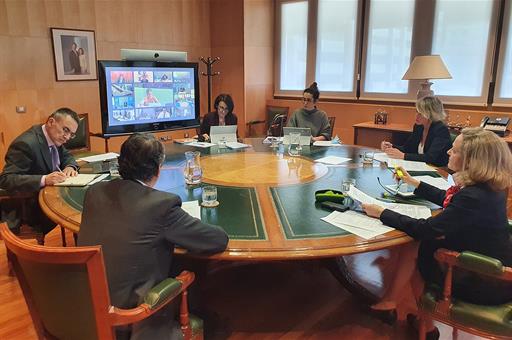Coronavirus COVID-19
Spain works at national and European level to guarantee interoperability of applications to prevent spread of infections to combat COVID-19
News - 2020.5.6
Spain is working at a national and a European level to guarantee the interoperability of applications to prevent new infections to combat COVID-19 which contribute to the transition towards a new normality.
This idea was conveyed at the informal European Council of telecommunications ministers held on Tuesday to address the implications of the health emergency in the digital and telecommunications sector.
The Third Vice-President of the Government, and Minister for Economic Affairs and Digital Transformation, Nadia Calviño, together with the State Secretaries for Digitalisation and Artificial Intelligence, Carme Artigas, and for Telecommunications and Digital Infrastructures, Roberto Sánchez, took part in this meeting to seek a common European position that allows the possibilities offered by technology to manage the pandemic and the subsequent recovery at a European level to be harnessed.
The focus of these potential digital solutions was on applications to prevent infections. In this regard, Spain underlined the importance of finding an EU-wide coordinated approach for these applications that guarantees interoperability and allows a joint exit from the health emergency to be employed.
It also pointed to the need to harness the potential offered by the digital economy to contribute to managing the pandemic, and the need to strike a balance between the benefits stemming from these innovations and privacy, security and ethical issues.
National work group
The first meeting was also held on Tuesday of the national work group on mobile apps to prevent new infections, particularly focused on interoperability protocols.
The State Secretary for Digitalisation and Artificial Intelligence, Carme Artigas, outlined to the corresponding regional councillors Spain's position at a European level, and the developments being prepared by the European Commission on these digital tools.
The aim is to join forces and share points of view on existing possibilities regarding the development of these applications and their interoperability, seeking coordinated responses based on the needs of different regions.
At this first meeting, they analysed the existing models, the challenges and opportunities offered, as well as technological and epidemiological matters that are necessary for the model to be implemented while catering for the needs of the public and the health authorities. To that end, it was agreed to set up specific work groups on functionality, privacy and interoperability.
Spain's position regarding digital tools to prevent new infections is in line with that of the European Commission and the European Data Protection Board, which advocated the implementation of a model that is voluntary, compatible with the General Data Protection Regulation, focused on protecting personal privacy and interoperable at a cross-border level.
The regional councillors for digitalisation, digital transformation and innovation policies shared their regional developments and their vision on the need to incorporate these technological tools in the transition process towards the new normality.
Tool for de-escalation process
The app to prevent new infections may become a useful and complementary tool to the health measures for the de-escalation process.
The functioning is based on the installation of an app in mobile devices, connected via Bluetooth, which emits and observes anonymous identifiers that change periodically. When two mobile devices have been in proximity for a certain period of time, they both save the anonymous identifier emitted by the other device and, if a user tests positive for COVID-19, it is possible to alert those mobile devices that have been in contact, while preserving the privacy of individuals.
These digital systems being considered at a European level use the Bluetooth connectivity of mobile devices, without employing personal data and while respecting people's privacy.
In this way, it is possible to have tools to prevent digital infections which complement manual actions and contribute to the transition towards the new normality.
The adoption of these tools will depend on the decision of the health authorities based on the results of the pilot projects to be launched in the coming weeks.
Non official translation





